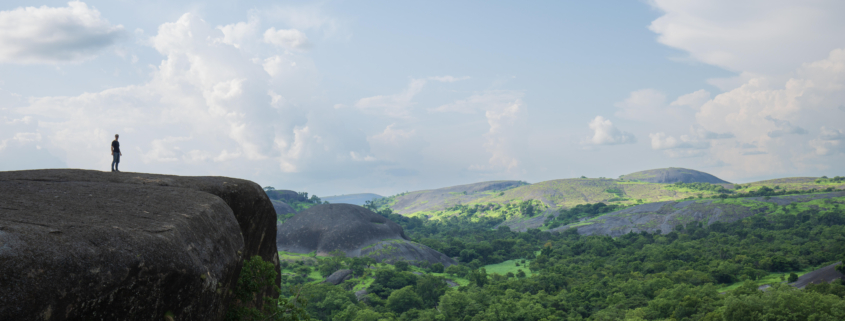This blog by Martina Santschi and CSRF calls for a conflict-sensitive engagement on communal land tenure, especially the use of rangelands, forests, and wetlands in South Sudan. As such, the blog is relevant for aid actors who engage in livelihood support, development, infrastructure building, support to returnees, refugees and IDPs, housing land and property issues, and conservation organisations. Settling and farming creates visible marks through buildings, roads, cleared land, ploughed soil, vegetables and grains growing…
repository
CSRF Research Repository
The CSRF Research Repository aims to support greater contextual knowledge for policy makers, programme managers, and implementers by providing a searchable repository of research, analysis, and resources, and providing periodic updates on new research and analysis.
Photo credit: Benoit Morkel / Fauna & Flora Written by Ranga Gworo, this blog explores the extent to which local communities in South Sudan value wildlife. It also discusses strategies that local communities use to protect wildlife. Finally, the blog shares some suggestions on how conservation interventions can apply conflict sensitive conservation approaches. South Sudan is rich in biodiversity. Despite years of conflict that has led to the reduction of the number of Africa’s Big…
Using the nexus lens, this brief discusses the drivers and the impact of flooding on local communities in South Sudan, including peace, health, livelihoods and governance. The brief also identifies and number of food response efforts and related perceptions of communities towards them. The brief provides a set of suggestions on how to enhance coordination on flood response though integrating humanitarian, peace and development nexuses into flood response in the country. Read more here
This research report focuses on coping strategies by South Sudanese households during severe food insecurity. Using the case of Leer, Pagak, and Rubkona countries of Upper Nile, the report finds that a combination of factors including conflict, displacement and flooding, have undermined the main livelihood means of local communities, with wild fruits and fishing becoming the main copying strategies. Finally, the report provides a nuance on how to effectively explore the coping strategies of households…
This analysis paper examines the political and environmental implications of the war on Sudanese and South Sudanese oil infrastructure. Specifically, the paper finds that the attacks by warring parties in Sudan on oil infrastructure and refineries have caused environmental pollution from crude oil contamination that affected soils and nearby ecosystems, promoting the construction of unsafe open-air reservoirs, which may cause environmental disaster due to flooding. Finally, the paper provides a set of recommends on how…
South Sudan has a diverse array of ecosystems, rich biodiversity in both flora and fauna, and an abundance of natural resources, including large areas of natural forests, considerable water sources and deposits of petroleum, gold and other minerals. The majority of the population in South Sudan are dependent on natural resources for subsistence livelihoods, particularly poorer and more vulnerable communities in rural areas. A combination of a shift to over-use of natural resources due to…
Fossil Fuel Industry adds Despair to South Sudanese Communities Facing Flood Disaster A new analysis by PAX, with contributions from Utrecht University, demonstrates how severe flooding in South Sudan spawns environmental risks around its national oil infrastructure. The report uses satellite imagery and a hydrological model to identify how the increasing seasonal flood impacts can pose additional environmental health risks to civilians and their livelihoods from potential pollution sources. Download
Uganda is one of the leading host countries for refugees in the East and Horn of Africa. Uganda’s location among instable neighbouring countries and its open door policy to refugees has seen a big number of refugees flowing into the country from Southern Sudan, Rwanda, Somalia, Burundi, Eritrea, Kenya, Ethiopia and Democratic Republic of Congo. Some of the refugees are hosted in Nakivale one of the biggest refugee camps in the country located in South…
One of the top priorities of the Government of South Sudan is to develop and implement sustainable management plans in the sub-sectors of the environment sector, so that the exploitation of natural resources does not adversely impact the environment. Until that is achieved, there is enormous pressure on natural resources, especially on the forests, as over 99 percent of the population of South Sudan depends on forests as their source of energy – fuel wood…
One of the top priorities of the Government of South Sudan is to develop and implement sustainable management plans in the sub-sectors of the environment sector, so that the exploitation of natural resources does not adversely impact the environment. Until that is achieved, there is enormous pressure on natural resources, especially on the forests, as over 99 percent of the population of South Sudan depends on forests as their source of energy – fuel wood…

Pages
- About Our County Profiles
- Blog
- Case Studies Grid
- Central Equatoria
- Conflict Sensitivity Resource Facility South Sudan
- Contact Us
- Contribute a Repository Article
- County Profile HTML links
- County Profiles
- COVID-19 HUB
- Covid-19 information page
- CSRF About Us
- CSRF Helpdesk
- CSRF Helpdesk Form
- CSRF Login
- Dashboard
- Deliverables
- Demo
- Events
- Forgot password
- Guides, Tools and Checklists
- Helpdesk
- Home
- Latest
- Looker Studio
- Subscribe

